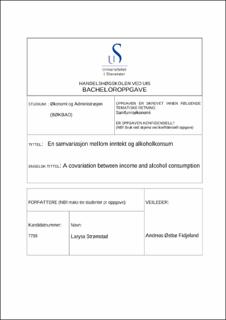En samvariasjon mellom inntekt og alkoholkonsum
Bachelor thesis
Permanent lenke
https://hdl.handle.net/11250/2773198Utgivelsesdato
2021Metadata
Vis full innførselSamlinger
- Studentoppgaver (Business) [1035]
Sammendrag
Formålet med denne oppgaven er å svare på forskningsspørsmålet om det er en samvariasjon mellom befolknings inntekt og alkoholforbruk i Norge. Tidligere undersøkelser viser at det er i mange land en klar sammenheng mellom inntekt og alkoholkonsum.Inntekt i denne oppgaven er definert som bruttoinntekt, og data er hentet fra Statistisk sentralbyrå (SSB). Alkoholkonsum er Vinmonopolets omsetning, og data er hentet fra Vinmonopolets salgstall. Årlig endring i gjennomsnittlig reell bruttoinntekt og årlig endring i liter alkohol per innbygger brukes som et mål på inntekt og alkoholforbruk.Dataprogrammet som ble brukt til å utføre analysen er statistikkprogrammet statistikkpakken IBM SPSS, Statistics 26. Regresjonsanalyse beskriver det forventede forholdet mellom inntekt og alkoholforbruk, samt korrelasjonen av inntektselastisitet. Resultatene viser at det er en stort sett positiv sammenheng mellom inntekt og alkoholforbruk, med høyere inntekt som forutsier en økning i alkoholforbruket, spesielt øl. Denne korrelasjonen er også i samsvar med teoriene som er presentert og tidligere forskning. The purpose of this thesis is to answer the research question of whether there is a covariation between the population's income and alcohol consumption in Norway.Previous surveys show that in many countries there is a clear connection between income and alcohol consumption.Income in this statement is defined as gross income, and data is obtained from Statistics Norway (SSB). Alcohol consumption is Vinmonopolet's turnover, and data are taken from Vinmonopolet's sales figures. Annual change in average real gross income and annual change in liters of alcohol per capita are used as a measure of income and alcohol consumption.The computer program used to perform the analysis is the statistical program Statistics Package IBM SPSS, Statistics 26. Regression analysis describes the expected relationship between income and alcohol consumption, as well as the correlation of income elasticity.The results show that there is a largely positive relationship between income and alcohol consumption, with higher income predicting an increase in alcohol consumption, especially beer. This correlation is also consistent with the theories presented and previous research.
